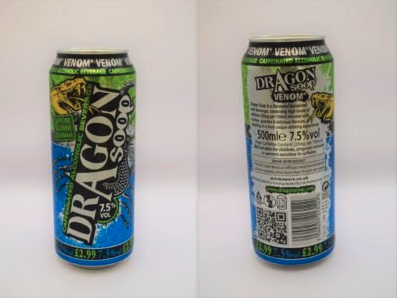This website uses cookies so that we can provide you with the best user experience possible. Cookie information is stored in your browser and performs functions such as recognising you when you return to our website and helping our team to understand which sections of the website you find most interesting and useful.
Complaint against Dragon Soop Venom upheld for association with ‘bravado’
A complaint against Corinthian Brand’s Dragon Soop Venom was upheld by the alcohol industry’s Independent Complaints Panel, which found that the product’s name and imagery suggested it “required bravado to drink it”.

The complaint was made by the Northern Ireland Alcohol and Drugs Alliance (NIADA) and was upheld under Code rule 3.2(b) as the packaging suggested an association with bravado, the UK’s Portman Group has said.
The panel claimed that the word Venom used in the product’s name and packaging “would be recognised by the majority of UK consumers to mean ‘poison’ in its day-to-day usage”. Dragon Soop Venom also contains a relatively high alcohol and caffeine content, the panel said, which contributed to concerns.
In its ruling, the panel concluded that “the name venom, in this particular context, and its presentation, in combination with the aggressive snake imagery, gave the overall impression that the product was marketed mainly on the danger association with venom, and therefore required bravado to drink it. For these reasons, the panel concluded that the packaging created an association with bravado.”
NIADA’s original complaint against the Corinthian Brand product stated that “we at NIADA believe that this drink breaches numerous rules stated in the code of conduct including the Alcoholic content, Strength, Appeal to under 18s, Popularity, Anti-social behaviour and Sexual Success”. The organisation also cited other highly caffeinated products which raised concern, including Screaming Devil and Four Loko.
However, the complaint was not upheld against five other Code rules, where the panel found that Dragon Soop Venom did not have a particular appeal to under-18s, there was no undue emphasis of the strength, the packaging clearly communicated its alcoholic nature, the product did not promote immoderate consumption and that the product and did not overemphasise the caffeine content or the effect that drinking caffeine and alcohol could have on consumers.
Commenting on the decision, Nicola Williams, the chair of the Independent Complaints Panel, said: “Whilst creativity and brands expressing their identities through their products is to be encouraged, care must be taken to avoid associating alcohol with bravado, or suggesting a consumer must be daring to drink it.. In this case, the name and imagery created an overall impression that was over the line of acceptability. For these reasons, it was a breach of the Code.”
A spokesperson from the NIADA said the organisation was “delighted” with the result and “satisfied” with the response from the panel.
Related news
Bourgogne wine see global growth despite difficult market conditions

